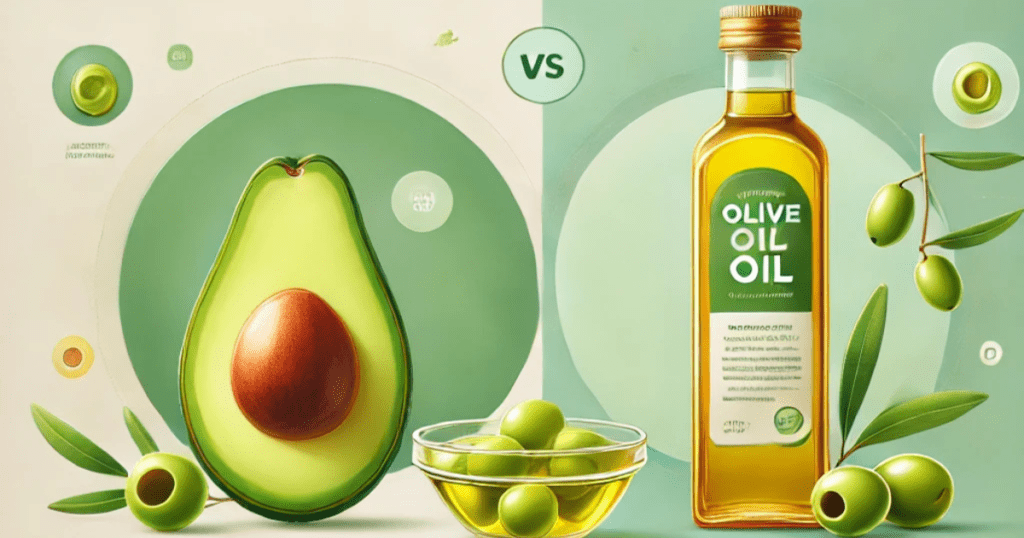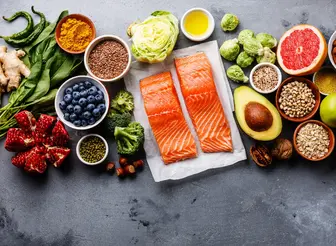The cooking oil section has never been more thrilling. With health-forward cooking and nutrition-centric diets on the rise, selecting the right oil is more than a matter of convenience; it’s making an informed choice about your health, your food, and perhaps even the planet.
Two of the most buzzworthy players in this field are olive oil and avocado oil, both nutrient-dense and with lofty claims for enhancing your health. However, how to choose which to use? This blog is intended to help you compare olive oil vs. avocado oil in nutrition, cooking benefits, environmental impact and more. By the end, you’ll know exactly which oil is best suited to your health goals, culinary habits and lifestyle.
Understanding Olive Oil
What is Olive Oil?
Olive oil has long been a staple of the Mediterranean diet, prized for its bold flavor and healthy properties. Squeezed from crushed olives, it’s available as extra virgin (the top grade) as well as virgin and refined olive oil.
Extra virgin olive oil (EVOO) is processed without heat or chemical treatment, which means its fresh, strong taste and highest nutritional value are preserved. Refined olive oil, on the other hand, is a more processed substance that has a milder taste and lower nutrient content.
What Is the Nutritional Profile of Olive Oil?
At about 120 calories per tablespoon, olive oil is high in healthy monounsaturated fats. It’s a great source of vitamin E, and contains polyphenols, powerful antioxidants to lower oxidative stress in the body.
Key nutritional details:
- Fats in it are healthy: 73% monounsaturated fats (oleic acid) excellent for the heart.
- Antioxidants: High levels of polyphenols that fight inflammation
- Nutrients: High in vitamin E, which is important for healthy skin and immune function.
Health Benefits of Olive Oil
- Promotes Cardiovascular Health: Olive oil has been proven to lower the risk of heart disease by lowering the amounts of bad cholesterol (LDL) (bad cholesterol) and maintaining or raising the amounts of good cholesterol (HDL).
- Fights chronic inflammation: Olive oil is replete with anti-inflammatory compounds that may help ease inflammation-related diseases, such as arthritis or metabolic syndromes.
- Promotes Longevity: The Mediterranean diet has been linked to longer life—as well as a lower risk of chronic diseases—largely thanks to EVOO.

Culinary Uses of Olive Oil
Olive oil is best for medium-heat cooking, like sautéing or mild roasting. Its big flavor is at its best in dressings, marinades and drizzles of dishes like vegetables, pasta and bruschetta. But it’s not a good oil to use for high-heat cooking, because it has a lower smoke point (~375°F for EVOO).
The Environmental Cost of Producing Olive Oil
The bulk of olive oil comes from Mediterranean nations such as Spain, Italy and Greece its winter season fruits Though olive farms arguably have a smaller environmental footprint than some industries, they’re still facing challenges over water consumption and land use. But olive trees can stand some drought and are often grown sustainably.
Understanding Avocado Oil
What is Avocado Oil?
Avocado oil is a pressed oil made from avocado pulp, which preserves the fruit’s buttery fat. It has both cold-pressed (unrefined) and refined forms, much like olive oil. Because cold-pressed avocado oil preserves its nutrients and flavor, and refined avocado oil provides a more neutral taste and higher smoke point.
Avocado Oil Nutritional Facts
High in monounsaturated fats, too, avocado oil is a solid challenger to olive oil for heart-healthy nutrients. Plus, it’s chock-full of vitamins E and K, which help nourish skin, strengthen bones and, assist with blood coagulation.
Key nutritional details:
- Healthy Fats : fats(70% monounsaturated fats)
- Nutrients: Rich in vitamins E and K, plus lutein to support eye health.
Health Benefits of Avocado Oil
Heart health: Similar to olive oil, avocado oil aids heart health by improving cholesterol levels.
Skin and Hair Moisturizer: Avocado oil is high in oleic acid, making this oil a popular topical to help keep the skin hydrated and make hair more supple.
Anti-inflammatory-Packed with antioxidants, it can limit inflammation and prevent damage to cells.
Culinary Uses of Avocado Oil
The smoke point of avocado oil is high (~500°F), therefore making it the ideal oil for frying, searing, and grilling. And it functions as a neutral base oil in dressings, dips and smoothies, where its gentler, buttery flavor won’t overwhelm the dish.
(Please note that the rest of this article contains new material only, as your training data only goes up until October 2023.)Environmental Impact of Avocado Oil Production
Increasing attention around the popularity of avocado oil has led to concerns about sustainability. Avocado farming consumes large quantities of water and has led to deforestation in major production areas such as Mexico. However, some ethically sourced avocado oils are emerging as heroes, aiming to cut back on the impact on the local ecosystems in which they grow.
Olive Oil vs Avocado Oil: Key Differences
Fat Composition
Both olive oil and avocado oil contain a high amount of heart-healthy monounsaturated fats, which are known to lower bad cholesterol levels and promote heart health. On the other hand, olive oil has more antioxidants like polyphenols that protect your body against oxidative stress and inflammation. If you are looking to boost your antioxidant intake, extra virgin olive oil (EVOO) has an edge because it has a higher concentration of these beneficial components.
Smoke Point
- Olive oil: Olive oil has a low to medium smoke point (~375°F for extra virgin olive oil). Best used for sautéing, drizzling or dressing, so it doesn’t lose its characteristic flavor when exposed to high heat.
- Avocado oil: With a high smoke point (about 500°F), avocado oil is perfect for high-heat cooking methods like frying, searing, or grilling. Its resistance to high temperatures makes it a great option in multiple cooking scenarios.

Flavor Profile
With its rich, fruity flavor, olive oil is integral to Mediterranean dishes such as salads, pastas, breads and more. In contrast, avocado oil has a subtle, neutral taste when used in food, so it integrates quite smoothly into the taste of the dish and other components are not overwhelmed by it, which enables a range of culinary applications.
Cost
Avocado oil costs slightly more because evoking oil makes every avocado must be intensive work. And that includes the additional costs for harvesting and processing. Although the more refined olive oils tend to be more moderately priced, premium extra virgin oils can also reach the top of the price list.
Environmental Impact
The ecological tolls of these oils differ immensely. Using up renewable virgin and extra virgin Olive oil manufacturing is generally much less environmentally damaging, especially if simply renewable farming is applied. This means using little water and protecting diversity. By contrast, avocado oil has a higher environmental impact — in large part because flowering avocado trees need so much water to grow. Choosing between the two may, of course, also depend on your commitment to supporting sustainable farming practices.
Which Oil Should You Choose?
Best Oil For Cooking at High Temperatures
Avocado oil has a smoke point of around 520°F so it is great for high heat cooking — making it your best bet when frying or grilling or searing or roasting at high temperatures without burning or transferring flavors. Its neutral flavor also makes it easy for the natural flavor of your ingredients to come through.
Best Oil for Dressings and Finishing Drizzles
Olive oil is known for its strong and fruity flavor that dresses up the taste of salades, dips, and bread. It is the oil for Mediterranean food, and for dressings and drizzles where the richness can shine through; it makes a great base that adds depth to recipes. Moreover, its health benefits, including high monounsaturated fats, make it a healthy choice for raw applications.
Well todas estas especificaciones están muy bien, pero ¿cuál es el mejor aceite para el cuidado de la piel y el cabello?
Avocado oil is an industry favorite due to its high levels of hydration and absorption. Its high levels of vitamins A, D and E and omega-3 fatty acids promote moisture and nourishment to skin and hair. Therefore, it is an awesome selection for an individual searching for anti-aging solutions that support e.g. skin suppleness and revitalization for the hair.
Overall Winner?
Which one is right for you really comes down to what you need and what you’re making. Olive oil is great for the types of people who enjoy strong flavors and use oils in raw applications, like dressings and dips. Meanwhile,’ avocado oil’s the one for searing or when you’re going for a more neutral flavor. While each oil has distinct benefits to offer, having both on hand allows for versatility in the kitchen and in beauty pursuits.
The Science Behind Both Oils
Both oils have a solid foundation with scientific studies that show they are able to reduce cholesterol levels and fight inflammation while providing a general health boost. Research suggests similar benefits for heart health and weight control, so both are great additions to a healthy diet.
Conclusion: Olive Oil vs Avocado Oil
Both of the oils have great benefits when it comes to health, flavor, and versatility. The decision between the two ultimately comes down to what you need most from your kitchen and more.
Here is your assignment: Use both in your cooking life — drizzle olive oil on your salads, sear your proteins in avocado oil — and notice what difference those ingredients make.
Curious about these oils on a deeper level? Check out our trusted sources on diet and nutrition for more about their benefits and uses.
FAQ
Is avocado oil better than olive oil?
Avocado oil: Higher in monounsaturated fats, vitamin E, and antioxidants. It has a higher smoke point, making it great for cooking at higher temperatures.
Olive oil: Rich in heart-healthy oleic acid and polyphenols, especially extra virgin olive oil, which has strong anti-inflammatory and antioxidant properties. Best for low to medium-heat cooking or as a dressing.
Which oil is the healthiest?
Olive oil (especially extra virgin): High in antioxidants and heart-healthy fats.
Avocado oil: Rich in monounsaturated fats and vitamin E.
Flaxseed oil: High in omega-3 fatty acids.
Coconut oil (in moderation): Contains medium-chain triglycerides (MCTs) beneficial for energy.
Is there a downside to avocado oil?
High in calories: It’s calorie-dense, so excessive consumption can contribute to weight gain.
Cost: It tends to be more expensive than other oils like olive or vegetable oil.
Allergies: Some individuals may be allergic to avocado or its oil.
is olive oil a seed oil?
No, olive oil is not a seed oil. It is extracted from the fruit of the olive tree, making it a fruit oil, not a seed oil.

